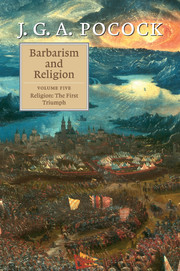Book contents
- Frontmatter
- Contents
- Preface
- Acknowledgements
- Advice to readers
- List of abbreviations
- Introduction
- PART I GIBBON'S ORTHODOX SOURCES
- 1 The Christian ancients: Eusebius and the Fathers
- 2 The Catholic moderns: history and authority
- PART II THE SOURCES OF PROTESTANT ENLIGHTENMENT
- PART III THE TWO CHAPTERS EXPLORED
- PART IV CONTROVERSY AND CONTINUATION
- Bibliography
- Index
2 - The Catholic moderns: history and authority
Published online by Cambridge University Press: 01 March 2011
- Frontmatter
- Contents
- Preface
- Acknowledgements
- Advice to readers
- List of abbreviations
- Introduction
- PART I GIBBON'S ORTHODOX SOURCES
- 1 The Christian ancients: Eusebius and the Fathers
- 2 The Catholic moderns: history and authority
- PART II THE SOURCES OF PROTESTANT ENLIGHTENMENT
- PART III THE TWO CHAPTERS EXPLORED
- PART IV CONTROVERSY AND CONTINUATION
- Bibliography
- Index
Summary
To turn from Gibbon's ancient to his modern sources for ecclesiastical history is to pass over many centuries, almost a millennium and a half, during which time much was written and many changes in perception occurred. Gibbon did not survey this history, and the ‘modern’ sources he used were comparatively recent, belonging in nearly all cases to a period of about one hundred years before the publication of the Decline and Fall. Though in consequence all belong to the era of Reformation and Counter-Reformation, he makes no attempt to cover the ecclesiastical histories belonging to that era as a whole. Cardinal Baronius, the great Catholic historical compiler of the late sixteenth century, is indeed prominent, as both authority and target, and may be said to form an exception; but the Catholic historians on whom Gibbon chiefly relied, and who form the subject of this chapter, were of the opinion that Baronius, though venerable, was now obsolete and not always reliable. Baronius's opponents, the Protestant Magdeburg Centuriators, are absent from Gibbon's text and references, and his sources may in general be said to belong to times later than Lutheran and Calvinist controversy with the Tridentine response to Reformation. His Catholic historians are French and belong to the siècle de Louis XIV: they are Gallican and Jansenist, and not more committed to a Roman view of church history than those adjectives imply and render necessary. Bossuet he knows but does not use; he is in search of erudition, not eloquence.
- Type
- Chapter
- Information
- Barbarism and Religion , pp. 46 - 86Publisher: Cambridge University PressPrint publication year: 2011



